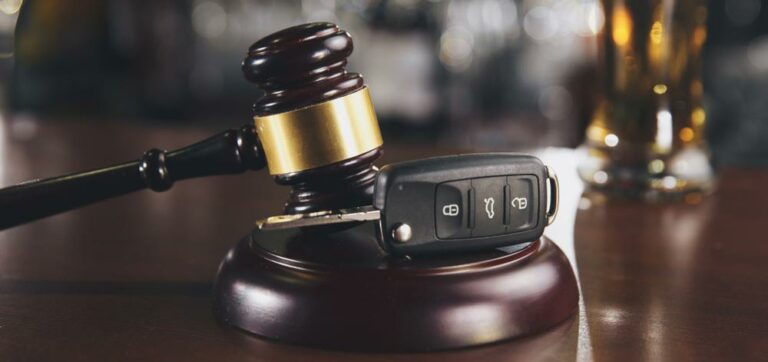Driving under the influence (DUI) charges are complex, but the situation becomes even more challenging when mental health issues are involved. For many individuals, comorbid mental illnesses such as depression, anxiety, PTSD, or bipolar disorder are contributing factors to their substance abuse and subsequent DUI offenses. Alcohol often becomes a means of self-medicating to cope with overwhelming emotions, leading to impaired judgment behind the wheel. Understanding the relationship between DUI and mental health is crucial in addressing these cases effectively.
In this blog, we explore the complex relationship between mental health disorders and DUI offenses, while emphasizing the importance of working with an experienced Indianapolis DUI attorney to ensure both legal and mental health aspects are properly addressed for a favorable resolution.
The Link Between Mental Health and DUI
Driving under the influence (DUI) is a serious offense with severe legal consequences, including fines, jail time, and license suspension. A DUI conviction can also lead to significant emotional and financial consequences, such as feelings of helplessness, isolation, depression, and financial burdens from court costs, and increased insurance rates. However, the relationship between mental health and DUI charges adds another layer of complexity to the issue. Individuals with mental health disorders may be at higher risk of committing a DUI, and understanding this connection is crucial for both prevention and legal defense.
Mental Health Disorders and Alcohol Abuse
Many people with mental disorders, such as depression, anxiety, PTSD, and bipolar disorder, turn to alcohol as a form of self-medication. This coping mechanism temporarily alleviates symptoms of their illness, but it also increases the risk of alcohol dependency. For these individuals, alcohol becomes a way to escape overwhelming emotions like hopelessness, anger, and fear. Unfortunately, this pattern often leads to impaired judgment, resulting in higher instances of DUI offenses.
Increased Risk of Recidivism
Individuals suffering from mental health issues are statistically more likely to be repeat offenders when it comes to DUI charges. According to studies, approximately one-third of people charged with a DUI are repeat offenders, and a significant number of these repeat DUI offenders also suffer from underlying mental health disorders. The combination of untreated mental health conditions and alcohol addiction creates a cycle of behavior that legal penalties alone are insufficient to address.
Mental Health Treatment as Prevention
Addressing the mental health component is essential for preventing future DUI offenses. Mental health services, including counseling and therapy, play a crucial role in addressing both mental health and alcohol dependency. Without proper treatment for both their mental health and alcohol dependency, individuals are likely to continue the dangerous behavior of drinking and driving. Mental health professionals advocate for a dual approach that treats both the underlying mental health disorder and the alcohol abuse problem, offering a more effective solution to breaking the cycle of DUI recidivism.
Challenges Faced by Defendants with Mental Illness in DUI Cases
Defendants with psychiatric disorders who face DUI charges encounter unique and difficult challenges. The legal system often struggles to adequately address the intersection of mental health issues and criminal behavior, leading to outcomes that may not fully consider the defendant’s underlying conditions. These challenges highlight the need for a more comprehensive approach to justice for individuals with mental health disorders.
Difficulty of Using Mental Illness as a Defense
One of the primary obstacles for defendants with mental health conditions is the difficulty of using mental illness as a defense in DUI cases. The presence of other psychiatric disorders, such as anxiety or depression, can further complicate the defendant’s ability to understand the consequences of their actions.
While some jurisdictions allow for insanity or mental incapacity defenses, these defenses are rarely successful. The legal threshold for proving that a defendant’s mental illness rendered them incapable of understanding the consequences of their actions is extremely high. Courts often maintain that individuals are responsible for their actions, even when their mental state may have impaired their judgment. This creates a significant barrier for defendants who struggle with severe mental health disorders.
Inadequate Consideration of Mental Health in Sentencing
In many DUI cases, the legal system tends to focus on punishment rather than rehabilitation, often neglecting the mental and emotional health of the defendants. Defendants with mental health issues are frequently sentenced without adequate consideration of their underlying mental conditions. Traditional DUI penalties, such as fines, jail time, and license suspension, do little to address the root causes of the behavior, such as untreated mental illness or addiction. This lack of focus on treatment can lead to repeat offenses, as the individual’s mental health issues remain unresolved, and they are more likely to relapse into dangerous behaviors.
Lack of Access to Specialized Treatment
Another challenge for defendants with mental illness is the lack of access to specialized treatment programs and mental health services within the criminal justice system. Even when courts acknowledge the presence of a mental health condition, defendants are not always provided with appropriate treatment options. Many correctional facilities are not equipped to handle complex mental health issues, and defendants may not receive the care they need during or after their incarceration. Without access to treatment, their mental health conditions may worsen, further increasing the likelihood of recidivism.
The Role of Mental Health Treatment in Preventing DUI Recidivism
Mental health treatment plays a critical role in reducing DUI recidivism among individuals struggling with both mental health disorders and alcohol addiction. Individuals facing DUI charges often experience significant mental and emotional stress, which can manifest as anxiety, shame, and fear of job loss. Addressing the underlying issues driving repeat offenses is essential for breaking the cycle of harmful behavior. Proper intervention and treatment can significantly decrease the likelihood of future DUI incidents and improve overall outcomes for affected individuals.
Dual Diagnosis Treatment
Many individuals facing DUI charges suffer from both a mental health disorder and alcohol addiction, a condition known as dual diagnosis. Obsessive-compulsive disorder is prevalent among individuals with dual diagnosis and can increase the likelihood of engaging in behaviors such as alcohol abuse, leading to DUI charges. Treating one issue without addressing the other is rarely effective, as the two conditions are often deeply intertwined.
Dual diagnosis treatment focuses on addressing both the mental health disorder and the addiction simultaneously. This comprehensive approach provides individuals with the tools and support they need to manage their mental health and reduce their dependence on alcohol, ultimately lowering their risk of reoffending.
Importance of Counseling and Therapy
Counseling and therapy are key components of mental health treatment for individuals with DUI charges. Therapy can help individuals understand the root causes of their behavior, develop healthier coping mechanisms, and address the emotional triggers that impact their emotional health and lead to substance abuse.
Cognitive-behavioral therapy (CBT), in particular, has been shown to be effective in helping individuals reframe negative thought patterns and reduce the impulsivity that often leads to DUI incidents. Regular counseling also offers continued support, helping individuals stay on track with their recovery.
Reducing the Risk of Relapse
Effective mental health treatment significantly reduces the risk of relapse into harmful behaviors, including drinking and driving. The prevalence of post-traumatic stress disorder (PTSD) among individuals can significantly impact the risk of relapse, as PTSD is often associated with elevated psychiatric comorbidity and other mental health issues.
By providing individuals with the skills to manage their mental health and addiction, treatment programs can help them avoid the situations and triggers that previously led to DUIs. Long-term treatment, including ongoing therapy and support groups, reinforces positive habits and builds a strong foundation for sustained sobriety, ultimately lowering the risk of future legal trouble.
Steps for Defendants with Mental Health Issues Facing DUI Charges
For DUI offenders with mental health issues, navigating DUI charges can be particularly challenging. However, taking the right steps early in the legal process can help ensure that both their legal rights and mental health needs are properly addressed. Here are critical steps that defendants should consider when facing DUI charges while managing mental health concerns.
Seek Immediate Legal Assistance
The first and most important step is to seek legal representation from an attorney experienced in both DUI cases and mental health defenses. An attorney can provide invaluable guidance and ensure that the defendant’s rights are protected throughout the legal process. Additionally, they can work to present the defendant’s mental health condition as a mitigating factor in the case, which may lead to reduced charges or alternative sentencing options that focus on treatment rather than punishment.
Compile Mental Health Documentation
Defendants should gather all relevant mental health records, including diagnoses, treatment history, and any medication prescribed by a healthcare provider. These documents can help establish the existence and impact of a mental health disorder, providing crucial context for the defendant’s behavior. This evidence can also support the argument that treatment, rather than harsh punishment, is a more appropriate course of action for the defendant.
Pursue Treatment Options
Defendants should proactively seek treatment for their mental health and any related substance abuse issues. Taking the initiative to begin or continue therapy, counseling, or addiction treatment demonstrates a commitment to addressing the underlying issues that contributed to the DUI charge. This proactive approach may be viewed favorably by the court, particularly if the defendant shows improvement and a reduced risk of reoffending.
Consider Mental Health Diversion Programs
In some jurisdictions, mental health diversion programs are available as an alternative to traditional sentencing. These programs focus on providing defendants with the mental health and addiction treatment they need rather than imposing jail time or other punitive measures. Defendants should work with their attorneys to explore whether such programs are available in their area and if they are eligible for participation.
Consult With an Experienced Indianapolis DUI Lawyer ASAP!
If you or a loved one are facing DUI charges and struggling with mental health issues, it’s essential to have the right legal support. Our team at Rathburn Law Office P.C., P.C. can help ensure your mental health needs are considered while protecting your rights and working toward the best possible outcome for your case.
Contact us at 317.671.8965 for a free case review!










